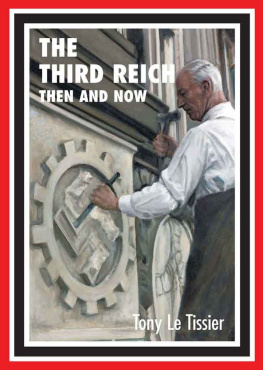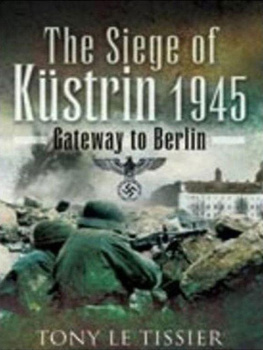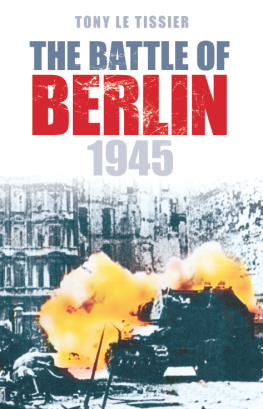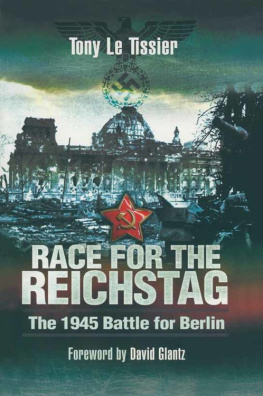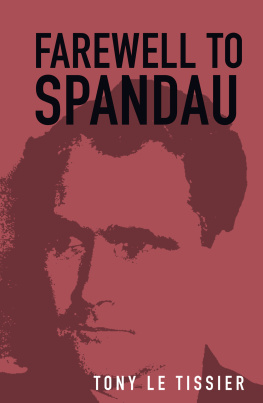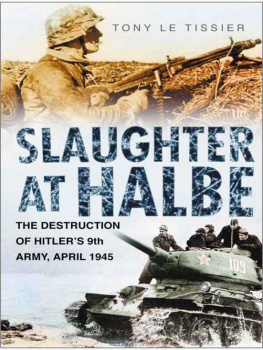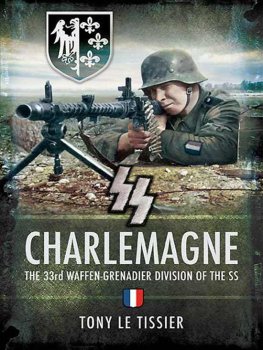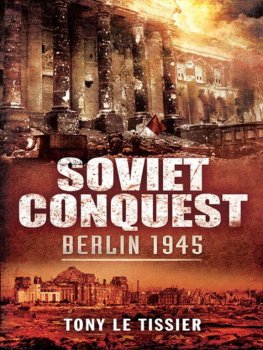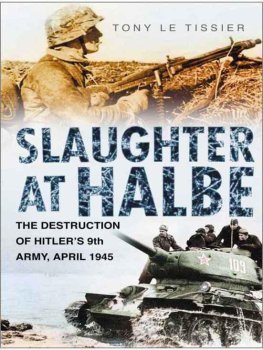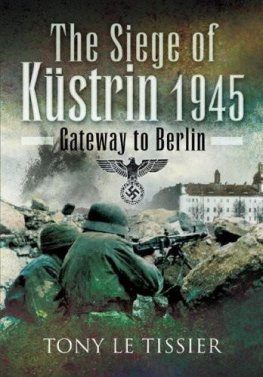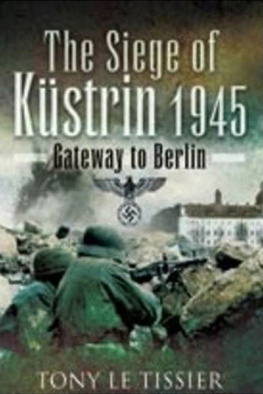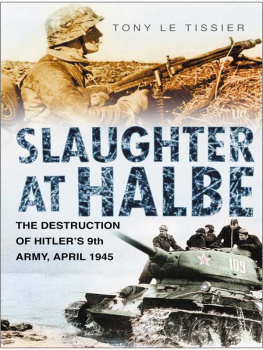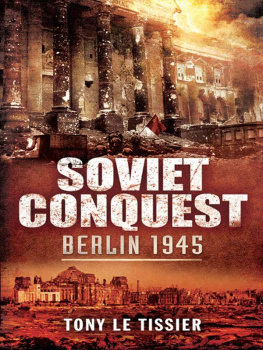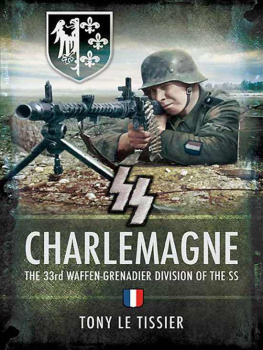






Dedicated to those that fought in these battles, those defending their country and people, those avenging the rape of theirs, victims alike of time and place.
Contents
xi
xiii
xv
PART I DEPUTY SUPREME COMMANDER
PART II THE BRIDGEHEADS
PART III LAUNCHING "OPERATION BERLIN"
PART IV THE BIG BATTLE
PART V BEYOND THE BREAKTHROUGH
Photographic essay follows page 180.
Maps
The author has provided his own maps to illustrate the action described in the text. For those who would like to have a general overview at hand, the author recommends the ADAC 1:150.000 map "Deutschland Blatt 21 Von Potsdam his zur Oder, von Berlin his Cottbus." More detailed 1:100,000 black and white maps of the area from the prewar "Kane des Deutschen Reiches," as used by the German General Staff, are also available in the series HK 100 DR/Gr, Nos. 245 (Freienwalde), 270 (Wriezen), 271 (KUstrin), 295 (Furstenwalde), 296 (Frankfurt), 319 (Beeskow) and 320 (Fdrstenberg).
These can be ordered by post from:

Preface
This book is a consequence of the collapse of Communism, the Soviet Union and the German Democratic Republic, all of which have opened up avenues of knowledge hitherto denied the public in the interests of political correctness.
Unraveling what occurred in the decisive fighting in the Oderbruch and for the Seelow Heights during the early part of 1945 has proved a fascinating and rewarding task, in which the accounts of Soviet commanders, produced a good twenty years after the event and subject to the current party line, have been of only limited use, whereas German survivors' accounts have proved very illuminating.
Conducting battlefield tours of the area for American, British and German groups convinced me of the need to write up this little-known element of relatively recent history, and I have been delighted with the generous response to my appeals for information from survivors and researchers alike. Sadly, and inevitably, some of my correspondents have died during the preparation of this work, which I hope will serve as a memorial to them and their contemporaries. Of course, in trying to understand what they went through, one cannot apply the freedoms of conscience and of choice of action that we enjoy today, for theirs was a world of rigid conformity and draconian discipline.
Acknowledgments
I would like to thank most warmly all those who have so generously assisted me with source material and encouragement in compiling this book:
Adolf Ayasse, Dr. Fritz-Rudolf Averdieck, Erwin Bartmann, Willi Bose, Col. Steve Bowman U.S. Army, Heinz Breitscheidel, Frau Heidemarie Daher, Dr. Anton Detter, Oberst a.D. Theodor von Dufving, Dr. Erich Fellmann, Jurgen Fiehne, Hermann Freter, Ernst-Christian Gadtke, Prof. Dr. (Med.) Wolfgang Gephardt, Oberst a.D. Horst Grabow, Erich Hachtel, Gerhard Hahn, Doroth&e Freifrau and Ludwig Freiherr von Hammerstein-Equord, Major Winfried Heinemann. Dekan a.D. Hartmut Heinrici, Oberst a.D. Harry Hermann, GenLt. a.D. Hans-Joachim von Hopffgarten, Alfons Jenewein. Friedrich Kaiser, Kurt Keller 11, Frau Marianne Klein, Dr. Hans-Werner Klement, Fritz Kniippel, Fritz Kohlase, Werner Kortenhaus. Erwin Kowalke, Prof. Dr. Werenr Kroemer, Erwin Kruse. Gunter Labes, Dr. Richard Lakowski, Oberst a.D. Dibbert Lang, GenMaj. a.D. Rudi Lindner, Major Vladimir V. Lukin, the "Mook wi" Old Comrades Association of the 20th Panzergrenadier Division in Hamburg, Captain Thomas Pike U.S. Army, Heinz Rall, Artur Romer, Oberstlt. a.D. Wolfgang Ruff, Friedhelm Schoneck, Joachim Schneider, Richard Schulte. Julius M. Schultz, Hans-Ulrich Seebohm, Christian Seeger, Lt. Col. Jevgeni Simanovich, GenMaj. a.D. Hans Spiegel. Helmut Stahl. Oberst a.D. Dr. Karl Stich, Hans Sturm, KarlHermann Tams, Dr. Hans J. Teller, Hermann Thranu, Gerd Wagner, Oberstlt. a.D. Helmut Weber, Ottmar Weis, Lennart Westherg. Horst Wewetzer, Horst Wilke, Oberst a.D. E. Wittor, Col. Tim Wray U.S. Army, Oberst a.D. Horst Zobel.
I would also like to thank Progress Publishers, Moscow, for permission to quote from Soviet literary sources, Chronos-Film GmhH for the use of photographs taken from original Soviet film footage in their archives, and also the Seelow Museum for some of their photographs.
CONVENTIONS
The word "detachment" as used for a subdivision of armored and artillery regiments by the Germans (Abteilung) and Soviets, is translated as "battalion" for convenience.
"Frankfurt-an -der-Oder", although not hyphenated in German, has been hyphenated here to conform to English usage, while the double "s", as in "BooBen", is given as "Boossen".
Postwar variations of place-names used in the text are quoted in parentheses in the Index.
GDR alterations of names such as "Neu Lewin" into "Neulewin" have been ignored, but should he expected on current maps of the area.
Timings in Soviet accounts are presumed to he Moscow Time and have therefore been converted to German Sumner Time.
Waffen-SS ranks are given as normal army equivalents, such as "SSMajor" and so on.
The pattern of narration is generally north to south, east to west.
Part I
DEPUTY SUPREME COMMANDER
1
The Man
The artillery bombardment that launched "Operation Berlin" was the mightiest that had ever been recorded. It started with an ear-shattering crack as tens of thousands of guns, mortars and rockets of all calibers opened fire simultaneously. Every available weapon, whether specifically targeted or not, participated in the terrifying opening salvo of this twenty-five-minute bombardment.
The volume of fire was so great that the earth trembled from the impact for miles around. In Berlin, some forty miles away, telephones jumped off their cradles and pictures fell off the walls.
The orchestrator of this extraordinary event with its cast of over threequarters of a million players was Marshal of the Soviet Union Georgi Kon- tantinovich Zhukov, Deputy Supreme Commander of the Soviet Armed Forces, already twice Hero of the Soviet Union and undoubtedly the most outstanding military figure to emerge on the Soviet side during the Second World War, or the Great Patriotic War of 1941-1945 as it was described in the Soviet Union.


